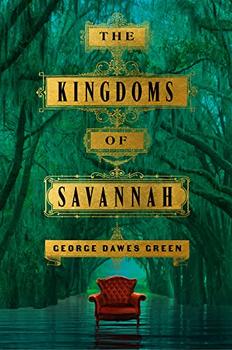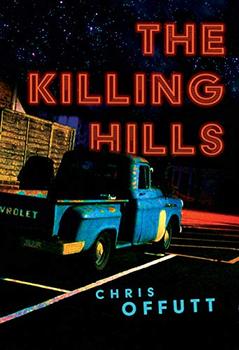Summary | Excerpt | Reading Guide | Reviews | Beyond the book | Read-Alikes | Genres & Themes | Author Bio

A Novel
by George Dawes GreenFrom the start of his novel The Kingdoms of Savannah, it's clear that George Dawes Green hails from Georgia. Whether depicting the humble starlight of a wooded homeless camp or the "soft crush of oyster shells" lining Turner's Rock — one of Savannah's most luxurious neighborhoods — Green's words transport you in a way only those of someone familiar with this place could.
The Kingdoms of Savannah, which is set in the titular historical city in contemporary times, revolves around the sudden disappearance of archaeologist Matilda Stone, a Black woman also known as "Stony." Matilda was the last to see Luke Kitchens — a young white man with bipolar disorder — alive before he was found burned in a locked room of an abandoned home. The home is owned by a white man named Archie Guzman, a much-loathed real estate mogul who has connections to both Luke and Stony that no one can at first identify.
Enter the Musgrove clan, four white siblings and their mother, whose collective dysfunctions run as deep as the labyrinth of tunnels lying beneath the streets of downtown Savannah. Like the Musgroves, these tunnels, proclaimed to be part of the sewer system, hold secrets. Rumor suggests they served as burial grounds during the height of yellow fever or conduits for alcohol smuggling and kidnappings during Prohibition. Bootlegging and the slave trade are part of the Musgroves' legacy, which explains some of the current tensions among them. There's Morgana, the brilliant but brutal matriarch, who inherited the Musgrove estate when her esteemed husband Fred passed. Willou is a high-ranking court judge. David is a bully and cold realist who can never forgive brother Ransom for the past. Bebe is an ER nurse living with her Black wife Roxanne and daughter Jacqueline — a young woman who worked at the bar where both Stony and Luke were last seen. And Ransom, the youngest Musgrove, once a practicing attorney and now homeless, has vowed to never associate with his family again.
Green portrays the complexity of family dynamics with skill and ease, using the murder of Luke and disappearance of Stony to slowly reveal subtle alliances and devastating rivalries. Subterfuge appears throughout the novel as each sibling probes the investigation in their own way, their only common objective being to keep Jaqueline safe from harm. This proves to be an insurmountable task, since young, headstrong Jaq is determined to solve the mystery herself, no matter the cost.
In addition, Green expertly coaxes colorful secondary characters to life ("rednecks, shrimp packers…old Billy Sugar with his long grizzled whiskers"). These figures appear peripheral at first, but some gradually develop into key players. The author crawls inside the head of each character, enlivening their personality quirks, dialect, fears and dreams, until it feels as if they're speaking directly to you.
And then there is the City herself, introduced with fragrances that leap off of the page — wisteria, jessamine, yellow climbing rose — and place names that sound like music — Lafayette, Tatemville, Montmillan Isle. One of these places holds the secret of something called the Kingdom, the treasure presiding at the heart of this gothic mystery.
While some of the characters' traits seem implausible at times (Jaq single-handedly delivers feats of prowess without batting an eye; Ransom has been estranged from high society for years, but is able to jump back into the milieu without missing a beat), the historical facts the novel is based on ring true. Green alludes to Savannah's dark capitalism and the audacity of the City's current elite, as present as the gorgeous columnar architecture of the home where Morgana Musgrove still resides. Behind every beautiful building lies slave labor and blood. Behind every development Guzman and his cronies pursue lies the land's Native history.
Yet there are also heroes, both dead and alive. In the square where Ransom and his homeless allies seek refuge, the rock memorializing Chief Tomochichi of the Yamacraw tribe stands. General James Oglethorpe (see Beyond the Book), the founder of the colony of Georgia, was a white man who insisted on honoring the Chief. Morgana reveals a noble side when granddaughter Jaq discovers one of her favorite paintings hanging in her grandmother's home, further evidence of their family's sordid past. And the Musician, a roving vagabond who is never seen but whose haunting whistle is legend, becomes central to Jaq and Ransom's search for Stony and the truth. The Kingdoms of Savannah is a deeply satisfying story that unwinds like the City's river — rich, silty and rippling towards a powerful twist of an ending.
![]() This review was originally published in The BookBrowse Review in September 2022, and has been updated for the
October 2023 edition.
Click here to go to this issue.
This review was originally published in The BookBrowse Review in September 2022, and has been updated for the
October 2023 edition.
Click here to go to this issue.

If you liked The Kingdoms of Savannah, try these:

by Chris Offutt
Published 2022
A literary master across genres, award-winning author Chris Offutt's latest novel, The Killing Hills, is a compelling, propulsive thriller in which a suspicious death exposes the loyalties and rivalries of a deep-rooted and fiercely private community in the Kentucky backwoods.

by Robert Crais
Published 2004
Venturing deep inside a complex psyche, Crais explores Elvis's need for family and his floundering relationship with Lucy, as they race the clock in their search to find their kidnapped son. This is Crais' richest and most intense tale of suspense yet.
It was one of the worst speeches I ever heard ... when a simple apology was all that was required.
Click Here to find out who said this, as well as discovering other famous literary quotes!
Your guide toexceptional books
BookBrowse seeks out and recommends the best in contemporary fiction and nonfiction—books that not only engage and entertain but also deepen our understanding of ourselves and the world around us.